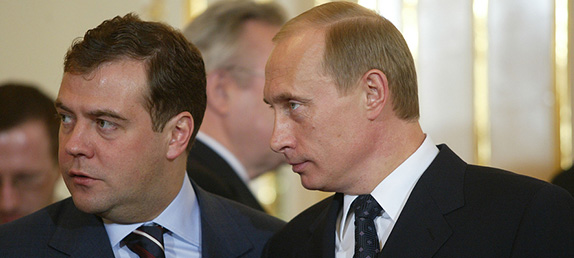
The government of Russia may start using the gold standard to back its currency and strengthen the less than stellar ruble, say analysts. Currency experts who are watching the situation with the ruble predict that it won’t be long before Russia is forced to dip into the nation’s gold reserves in order to shore up the national economy.
There were rumors in December of 2014 that Russia was going to sell its gold reserves as a way to bolster its economy, rather than use them to back their currency. Those rumors were proven to be untrue when it was revealed that Russia is continuing to buy gold. It is this continuance of gold buying by the Russian government that is now making currency experts believe a change to the gold standard could be in Russia’s future.
The decision to change to the gold standard is ultimately in Vladmir Putin’s hands. Banks in Russia may independently begin to adopt the gold standard, but most of them probably will not do so unless forced by Putin. The virtually worthless ruble means that Russia is already using the much stronger U.S. dollar for international trade. Moving to the gold standard would mean Russia could use its own money again, and that money would have a higher international value. This move would give Russia more economic independence, something Putin very much desires.
Putting the nation’s economy on a gold standard could be a good move for Russia. The world has already seen the chaos that ensued when U.S. President Nixon removed the United States from the gold standard in the 1970s. It caused inflation and a decrease in the availability of oil, which caused long lines to form at gas stations—and they didn’t always have the supply to fit the demand. Prior to the removal of the gold standard, any U.S. dollar could be traded for an equal amount of gold, and vice versa, so that the nation’s money supply was limited by the amount of gold it had in reserve.
Moving to a gold standard may limit Russia’s available currency, but it will make that currency much stronger. By continuing to buy gold, Russia is ensuring that it will have more money in circulation if it does make the move to the gold standard. This will allow it to be a stronger, more reliable and trustworthy trading partner with other countries. In fact, Russia is already forming close economic ties with China through trading and currency exchanges.
Russia’s national gold reserves rose from 37.6 million ounces in November 2014 to 38.2 million ounces in December 2014. This proved to speculators that the nation was not trading gold for paper currency of other nations to strengthen the ruble. The ruble is currently at its lowest value since 1998, and the government is looking for ways to fix this. Moving to the gold standard is just one of many ways the situation could be handled. However, Russia’s continuing to purchase gold seems to indicate the gold standard is the solution that is most seriously being considered at this time.
When and if Russia moves to the gold standard is still anyone’s guess. However, such a move would undoubtedly raise gold prices worldwide as demand for it increases with Russia’s continued acquiring of it. It would also make Russia a stronger economic player worldwide, which will change the way many nations handle trade. The standard of living and personal economic power of individual Russian citizens would also no doubt increase with the eventual, inevitable adoption of the gold standard in Russia.

